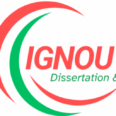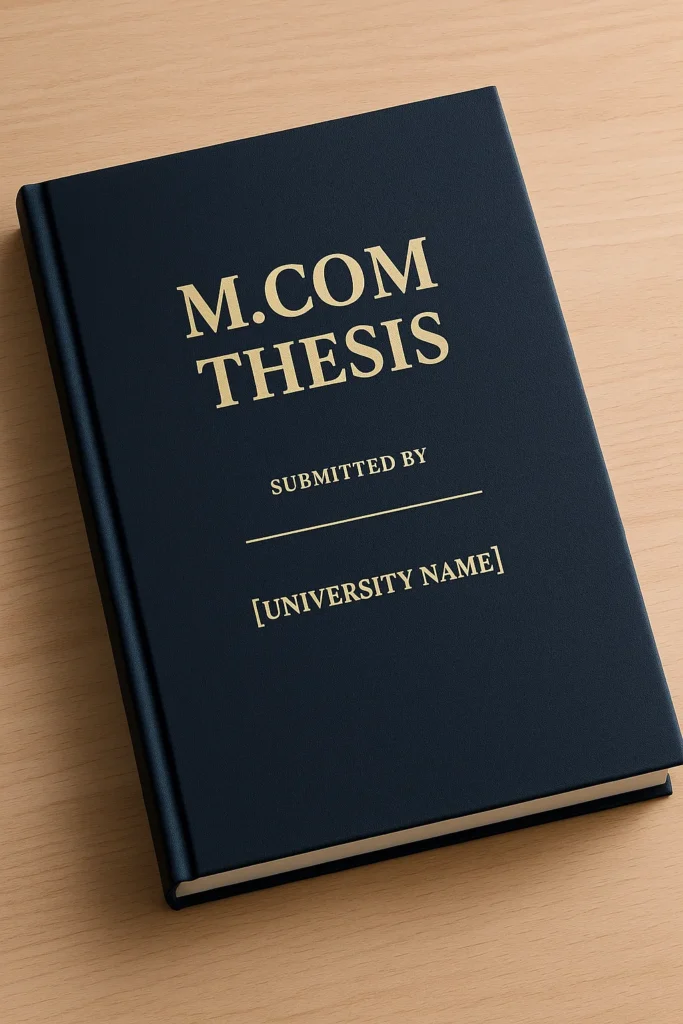The Master of Commerce (MCom) program offered by the Indira Gandhi National Open University (IGNOU) is one of the most popular choices for students seeking an in-depth understanding of commerce, business, and finance. One of the most important components of the MCom curriculum is the project work, which allows students to apply their theoretical knowledge in a practical context. Selecting the right IGNOU MCom Project Topics is crucial for a successful project. It can set the tone for your research, impact the quality of your analysis, and even shape your future career in the field of commerce.
Criteria for Selecting the Right IGNOU MCom Project Topic
When selecting a project topic, it’s important to choose one that aligns with your academic interests, the current trends in the field, and your career aspirations. Here are a few criteria to keep in mind:
- Relevance to the Course: The project should reflect the concepts and skills you’ve learned in your MCom coursework.
- Industry Trends: Choose topics that are in line with emerging trends in commerce, finance, and business.
- Personal Interest: Select a topic that genuinely interests you, as it will make the research and writing process more enjoyable.
- Availability of Resources: Ensure that sufficient data and resources are available for your project.
A well-defined objective and hypothesis will guide your research and ensure that you remain focused on the goals of your MCOM project.
Top 25 IGNOU MCom Project Topics for 2025
Here are 25 potential IGNOU MCom Project Topics for 2025, with their corresponding objectives and hypotheses:
- Impact of E-Commerce on Traditional Retail Business in India
- Objective: To analyze the shift in consumer behavior towards online shopping.
- Hypothesis: E-commerce has significantly impacted the revenue of traditional retail businesses in India.
- Role of Corporate Social Responsibility (CSR) in Brand Loyalty
- Objective: To examine how CSR initiatives affect consumer perception and brand loyalty.
- Hypothesis: CSR initiatives increase customer trust and loyalty towards a brand.
- Financial Inclusion and Economic Growth: A Study of Rural India
- Objective: To assess the impact of financial inclusion policies on rural economic development.
- Hypothesis: Financial inclusion leads to greater economic growth in rural areas of India.
- Consumer Behavior towards Sustainable Products
- Objective: To explore consumer attitudes and behaviors towards eco-friendly products.
- Hypothesis: Consumers are willing to pay more for sustainable and environmentally-friendly products.
- The Effect of Digital Payment Systems on Consumer Spending Behavior
- Objective: To study how digital payments influence consumer spending.
- Hypothesis: Digital payment systems lead to an increase in consumer spending due to ease of transaction.
- The Impact of GST on the Indian Economy
- Objective: To analyze the effects of Goods and Services Tax (GST) implementation on Indian businesses.
- Hypothesis: GST has streamlined tax processes but caused initial disruptions in certain sectors.
- A Study on the Financial Performance of E-Commerce Companies in India
- Objective: To evaluate the financial growth and sustainability of e-commerce companies in India.
- Hypothesis: E-commerce companies in India have shown significant growth due to changing consumer habits.
- Corporate Governance and Financial Performance: A Study of Indian Firms
- Objective: To analyze the relationship between corporate governance practices and financial performance.
- Hypothesis: Companies with better corporate governance practices tend to perform better financially.
- Effectiveness of Digital Marketing Strategies in the FMCG Sector
- Objective: To explore the use of digital marketing strategies in the fast-moving consumer goods (FMCG) sector.
- Hypothesis: Digital marketing strategies increase consumer engagement and boost sales in the FMCG sector.
- Investor Behavior towards Mutual Funds: A Study of Indian Investors
- Objective: To understand the decision-making process of investors in the Indian mutual fund market.
- Hypothesis: Indian investors prefer low-risk mutual fund options, impacting their investment choices.
- Role of Financial Derivatives in Risk Management for Corporates
- Objective: To assess how financial derivatives are used by businesses to manage risks.
- Hypothesis: The use of financial derivatives reduces the overall risk faced by corporations.
- The Influence of Social Media on Consumer Purchasing Decisions
- Objective: To examine the effect of social media marketing on consumer behavior and purchasing decisions.
- Hypothesis: Social media marketing significantly influences consumers’ purchasing decisions.
- Impact of Inflation on Stock Market Performance in India
- Objective: To investigate how inflation rates affect the performance of the stock market in India.
- Hypothesis: Higher inflation leads to a decrease in stock market performance.
- A Study on the Role of Entrepreneurship in Economic Development
- Objective: To explore how entrepreneurship contributes to the economic growth of a nation.
- Hypothesis: Entrepreneurship leads to job creation and economic stability.
- The Impact of Work-from-Home Culture on Employee Productivity
- Objective: To study the effect of the work-from-home culture on employee performance and productivity.
- Hypothesis: Employees working from home experience increased productivity due to flexibility.
- Financial Analysis of Startups: Challenges and Opportunities
- Objective: To analyze the financial challenges faced by startups in India.
- Hypothesis: Startups in India face significant financial challenges, including cash flow issues and funding constraints.
- Role of Blockchain in Transforming Financial Services
- Objective: To explore how blockchain technology is reshaping financial transactions and services.
- Hypothesis: Blockchain technology reduces fraud and enhances the transparency of financial services.
- The Impact of Artificial Intelligence on Financial Decision Making
- Objective: To study how artificial intelligence is affecting financial decision-making processes in businesses.
- Hypothesis: AI tools improve the accuracy and speed of financial decision-making.
- A Study on the Effectiveness of Tax Reforms in India
- Objective: To evaluate the impact of recent tax reforms on businesses and taxpayers in India.
- Hypothesis: Tax reforms have improved compliance but faced resistance from certain sectors.
- Role of Big Data in Shaping Business Strategies
- Objective: To examine how businesses use big data analytics to shape their marketing and operational strategies.
- Hypothesis: Big data analytics enables businesses to make more informed and effective decisions.
- Economic Impact of Tourism on Local Economies
- Objective: To assess the economic benefits of tourism for local communities.
- Hypothesis: Tourism contributes significantly to the economic growth of local economies.
- The Relationship between Leadership Styles and Organizational Performance
- Objective: To explore how different leadership styles influence organizational performance.
- Hypothesis: Transformational leadership leads to better organizational performance compared to transactional leadership.
- Impact of Automation on Job Creation in the Manufacturing Sector
- Objective: To analyze the impact of automation on employment levels in the manufacturing sector.
- Hypothesis: Automation results in job displacement but also creates new opportunities in tech-related roles.
- Corporate Tax Evasion: A Study of Indian Firms
- Objective: To examine the extent and causes of corporate tax evasion in India.
- Hypothesis: Corporate tax evasion in India is influenced by loopholes in the tax system and poor enforcement.
- The Role of Green Finance in Promoting Sustainable Development
- Objective: To explore how green finance initiatives are supporting sustainable development goals.
- Hypothesis: Green finance encourages businesses to adopt environmentally sustainable practices.
How to Structure an IGNOU MCom Project
A well-structured project report is key to success. Here’s a general outline for your MCom project:
- Introduction: Provide an overview of the topic, its relevance, and the research objectives.
- Literature Review: Review existing research and theories related to your topic.
- Methodology: Outline the research methods and tools used for data collection.
- Data Analysis: Present your data, analyze it, and interpret the results.
- Findings and Discussion: Discuss the implications of your findings.
- Conclusion: Summarize the key points and suggest recommendations.
Final Tips for Completing the MCom Project
To successfully complete your IGNOU MCom Project, ensure you:
- Start early and manage your time effectively.
- Keep your objectives and hypotheses clear and concise.
- Follow the structure outlined above for a logical flow.
- Stay updated with the latest research and trends in your chosen field.
Related Post
Conclusion
Choosing the right IGNOU MCom Project Topics is essential for a successful academic journey. The 25 topics listed in this article offer a mix of contemporary issues and timeless subjects, providing you with a solid foundation for your project. Make sure to select a topic that resonates with your interests and career aspirations, and approach it with a clear objective and hypothesis to ensure a meaningful and impactful study.

